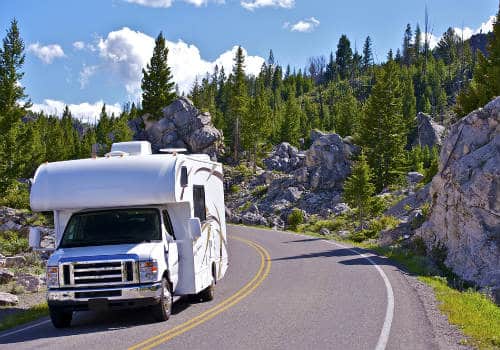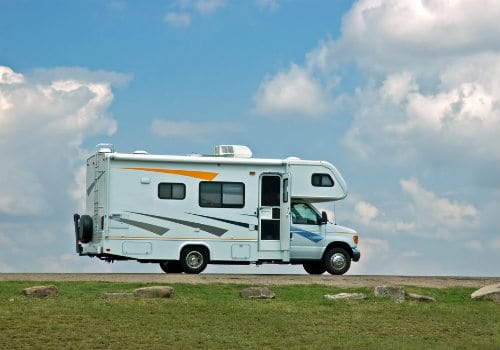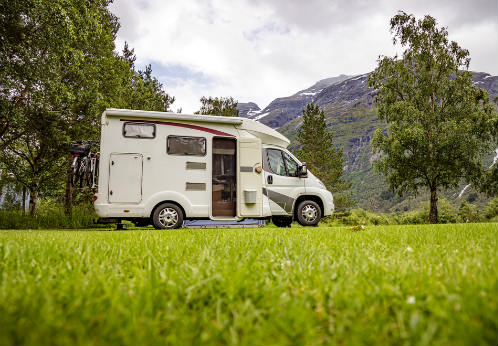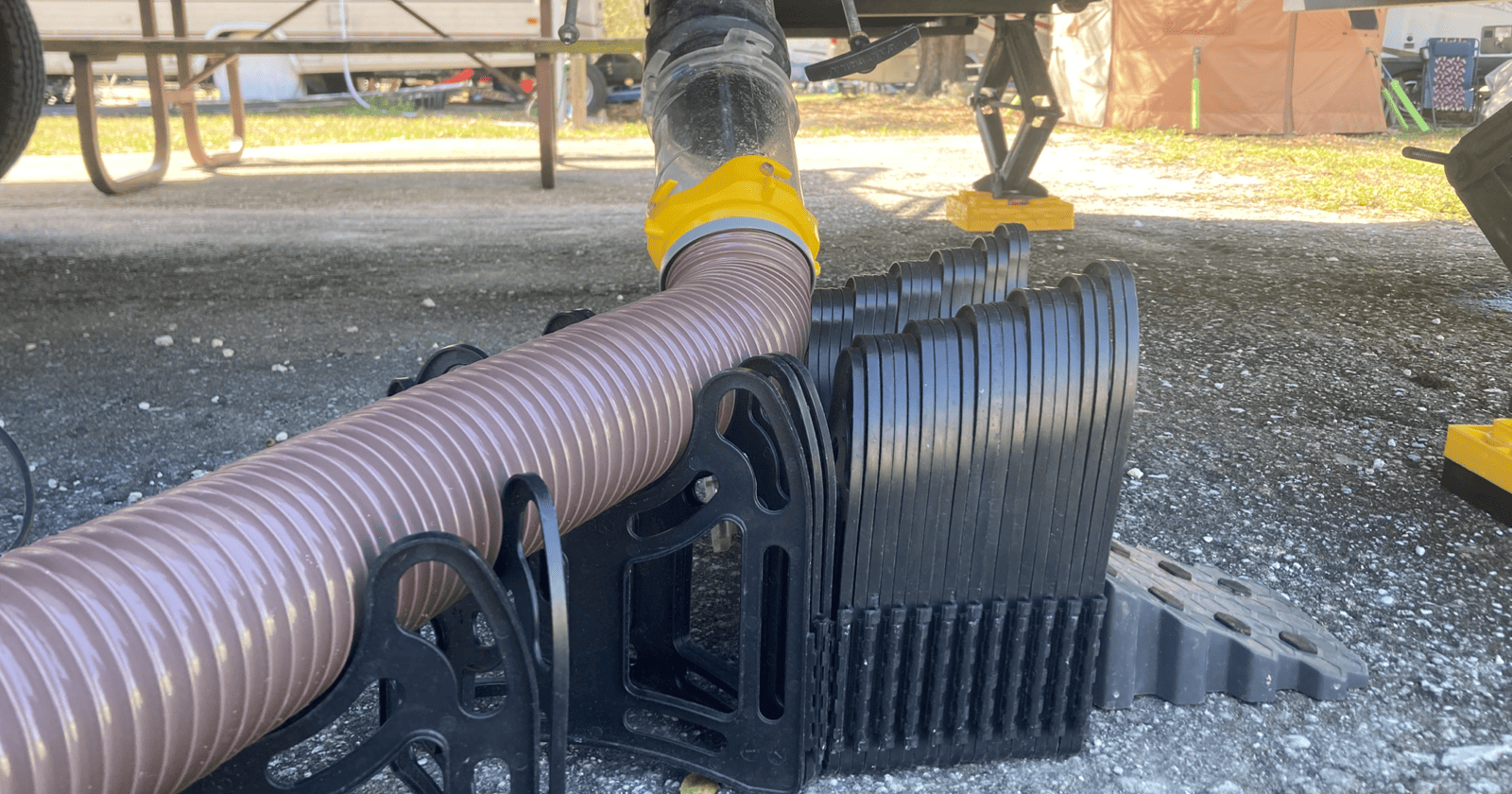You pull up with your brand new RV feeling on top of the world. You’ve worked hard for years to achieve this moment. As you exit your motorhome, your know-it-all socially conscious daughter comes out of the house calling you a planet killer due to the poor gas mileage.
Before you send her to her room, you let her know that vacations that use commercial airlines, hotels, and rental cars use more fossil fuels than an RV vacation. RVs are generally more green because you waste less food and produce less garbage. If that doesn’t quiet her down, you can always remind her that she can stay with her grandparents while the rest of you enjoy the trip.
Now that you have your dream RV, it’s time to plan out the details of your trip. You know you’re going to boondock at various locations on your way to your destination and know your cost per night at the campground. You’re happy with most of your expenses, but how does it cost that much to drive an RV?
Fuel Will Be the Biggest Part of Your Vacation Costs. Half of Your Planned Expenses Will Be Spent on Your Fuel Tank.
Knowing the average MPG an RV can get can help you determine what type of coach fits your family’s lifestyle the best. There are steps you can take to increase your RV’s MPG and conserve fuel. With these methods, you’ll find that the cost to drive your RV will decrease.
What Is Gas Mileage

Gas mileage (MPG) is the distance (miles) you can travel per unit (gallon) of fuel. The goal is to get the most distance possible out of one unit of fuel. This is one of the big reasons why hybrid cars and SUVs are outselling all other vehicles on the market.
To aid in the gas mileage issue, RV manufacturers are using lightweight materials in their products in recent years. By making them lighter, drivable and towable RVs are showing positive mileage differences compared to older versions. Yet, with their weight, you can still expect low averages.
Calculating Gas Mileage
To understand how MPG works, you can calculate your RVs miles per gallon yourself. This will help you with planning your fuel costs on your trip. For the amount of fuel your gas tank holds, we advise using the amount from full to a quarter tank, because it’s never a good idea to run your tank dry.
According to AAA.com, on March 7th, 2020, national gas prices are averaging $2.40 per gallon. For our purposes, we’ll assume your motorhome has an 80-gallon tank and uses 60 gallons before you need to fill up.
Once you fill up your tank completely, set your trip meter back to zero. Drive until you reach a quarter tank. For our purposes, we’ll say you drove 420 miles.
If you divide 420 miles by 60 gallons, the result will be 7. This means that your RV gets 7 miles to the gallon. The average Class A motorhome gets between 6-8 MPG, so if you’re driving a Class A with a gas engine, you’re on track.
To calculate your average fuel cost, you’ll multiply $2.40 (or that particular day’s fuel price) by 60 gallons. The result is $144. This means that for every 420 miles you drive, you’re going to spend between $410- $430 to fill your fuel tank (this allows for daily price fluctuation).
Now that you know this, you can plan your fuel costs. Using websites like Google Maps can help you determine the distance you’ll travel, so you can break that up by 420-mile sections. We do recommend that whatever total you come up with, add an extra tank of fuel for unplanned driving, gas price fluctuation, and generator usage.
RV MPG Comparisons

How bad is RV gas mileage without perspective? They’ll never measure up to passenger vehicles because of their weight, bad aerodynamics, and bigger size. While they’re both motorized vehicles, it’s like comparing an apple to a hamburger.
The average MPG of an 18 wheel tractor-trailer is less than 6 miles to the gallon. Comparatively, motorhomes have a better fuel economy than these commercial vehicles. Many over-the-road truckers pay over $100,000 a year in fuel expenses that cut into their take-home pay.
Diesel Versus Unleaded Gasolene
In the great debate over diesel versus unleaded gasolene, there are pros and cons to diesel RVs. While diesel motorcoaches are more luxurious, they’re also significantly more expensive. The same can be said about diesel fuel.
Diesel RV engines, on average, get between 10- 15% better fuel efficiency than gas motorhomes. On the other side of the coin, they have bigger fuel tanks and diesel usually costs more per gallon. When a diesel motorhome breaks down, their parts can be double the price of a gas motorcoach, but they breakdown less often.
From a fuel standpoint, only you can determine if one is better than the other. Many diesel pushers have fuel tanks between 100-200 gallons. Gas motorhomes range between 55- 80 gallons.
RV MPG Per Type
| RV TYPE | MPG | Tank Capacity – Gallons |
| Class A Diesel | 8-12 | 100 – 200 |
| Class A Gas | 6-10 | 55 – 80 |
| Class C | 8-14 | 24 – 31 |
| ClassB | 14-18 | 30 – 70 |
From the table above, you can see that the smaller motorhomes have better fuel economies than the larger ones. Some of the biggest ones can be as low as 4 MPG due to their massive weight. If you want ultimate luxury with all of the home-like features, you’ll pay for it in price and MPG.
For the towable classes, it mostly depends on your tow vehicle. You can expect that your trailer or fifth wheel will decrease your miles per gallon due to the weight and drag. Generally, you can assume a 2-5 MPG decrease.
Earth Traveler Teardrop: Best RV for Ultimate Gas Mileage
There is one RV that will give you the best gas mileage in the industry. The Earth Traveler T300 weighs less than 300 pounds. It’s so light, and you can tow it with a hybrid or all-electric car.
This handmade teardrop class travel trailer is weatherproof and aerodynamic. Its starting price is $10,000, but there are add-ons to increase the camping experience. There are tents that attach to the trailer and a kitchenette piece that increases the coach’s capabilities.
You can also add a flexible solar panel and battery for power usage. They have road safety packages, heating, and cooling units. Overall, you can make this RV as complex as you want and still have the ultimate MPG RV.
A Gallon Saved, Is a Gallon Earned
You may be asking yourself, “what are the best ways to save fuel in my RV?” There are some great strategies you can use that can shave off a significant amount of money from your fuel budget. All of these methods are realistic and don’t require much effort to achieve.
- Plan Your Trips: Using apps and websites like Google Maps can help you find the best routes to take. They show you the fastest routes, construction areas, and alternate routes to avoid congested traffic areas. You can also measure out your distance to determine how many tanks of gas each leg of your trip will take.
- Pack Smart: Gross Vehicle Weight (GVW) affects the average MPG on your camper. The lighter your total weight, the better your fuel economy. Thinking through what you need to pack, and what you can pick up on the way can lower your GVW substantially.
- Keep Your RV Maintained: A well-maintained RV will give you many more miles to the gallon than one that is overdue. Keep up with your oil changes, tire pressure, and other automotive care. Not only will this increase your MPG, but it also lowers breakdown risks while you’re on the road.
- Install A Fuel Economy Chip: Fuel Economy Chips (also called performance chips) adjust your air to fuel ratio and ignition timing. Many performance cars use these chips to enhance horsepower or torque. Their programming can be tuned to increase your fuel economy.
These chips are legal in all 50 states and on the federal level. They are an aftermarket item that can be purchased on Amazon and other RV retailers. You will see a beneficial RV gas mileage comparison once you install it.
- Use Apps and Discount Club Cards: In today’s world, there’s an app and club for virtually everything. Apps like GasBuddy.com can help you find the best gas price in the area you are in. Discount programs like Good Sam’s Club offer fuel discounts at Pilot/Flying J and other RV related places.
- Avoid Rush Hour and Heavy Traffic: The stop and go of heavy traffic burns a lot of fuel. If you can avoid the morning or evening daily commute traffic, when you have to go through major cities, this will save you gallons of fuel. Traveling south during the holiday season on major interstates can also hold you hostage in traffic. If you’re stuck in traffic there’s a way to save fuel. If you haven’t moved after a few minutes, go ahead and shut your engine off. It doesn’t cost extra fuel to start up a hot engine.
- Keep Your Speed In the Sweet Spot: To get the optimum motorhome gas mileage, keep your speed in the sweet spot. Motorhome engines have an ideal cruising speed they’re designed for. Newer coaches are set for 65 miles per hour. There’s a mileage difference because, for every five miles above your ideal speed limit, you’re losing 7-8% MPG. You may be shaving off time, but the fuel you’re burning to maintain that higher speed might not be worth it. Driving at those higher speeds can make your RV unstable to the point of flipping if the police don’t pull you over first.
- Ease Up, Ease Down: In the Movie, Space Cowboys, Tommy Lee Jones referred to the space shuttle as a “Flying Brick.” Your motorhome is essentially a “rolling brick,” not a Ferrari racing the 24 hour Le Mans course. Easing into your acceleration and your braking saves you up to 20% of fuel. By flooring your gas pedal, you’re flooding your engine with fuel. When you’re braking, you’re not only fighting the RV’s weight, you’re also fighting all of that energy in the engine. Slowing down gradually allows the engine to wean itself off of the fuel more efficiently.
Another RV MPG optimizer is using cruise control. On those long stretches with light traffic, the cruise function maintains your speed through your vehicle’s computer. This feature can extend your mileage on a single tank.
- Minimize Generator Usage: You may have figured out your distance based on how much gas your RV holds, but did you consider your generator usage? Motorhome Jennys get their fuel from the RV’s fuel tank. Its fuel consumption can be barely noticeable, but keeping it running can cut down your distance per tank distinctly.
If you’re using it on the road, a good idea is to leave it on long enough for everyone to charge up their mobile devices. If its a matter of keeping the coach’s air conditioning on, you can open the mid-coach and back coach windows to create a wind tunnel. When you’re boondocking, if you can “tough it out” without the A/C all night, that’s gas you’re saving.
- Fill Up During Weekdays: Gas companies are like Santa Claus. They know when you are commuting for work and when you are traveling for fun. Gas prices are usually higher on weekends than on weekdays. If you know you’re taking a weekend camping trip, try to fill up your tank Monday- Thursday to get the best prices.
- Keep To The Best Terrain When Possible: Official testers determine how many miles to the gallon an RV gets by measuring them on flat paved roads. This is when they are getting their best fuel efficiency. Inclines, dirt, snow, ice, and other non-ideal road conditions reduce MPG.

Pieces of the Puzzle
Using one of these strategies alone can help save you fuel and increase your MPG by small percentages. Combining them will increase your chances of saving a whole tank. We don’t recommend increasing your stress level over all of this.
You’re supposed to be on vacation to relieve yourself of stress. If you do get stuck in traffic, don’t worry about it. The route you planned falls apart, relax and take a deep breath.
One of the great things about the RV lifestyle is the fun and adventure you find during the journey. It’s the little things that you remember the most. As long follow the tips above to the best of your ability, you’ll be just fine.




